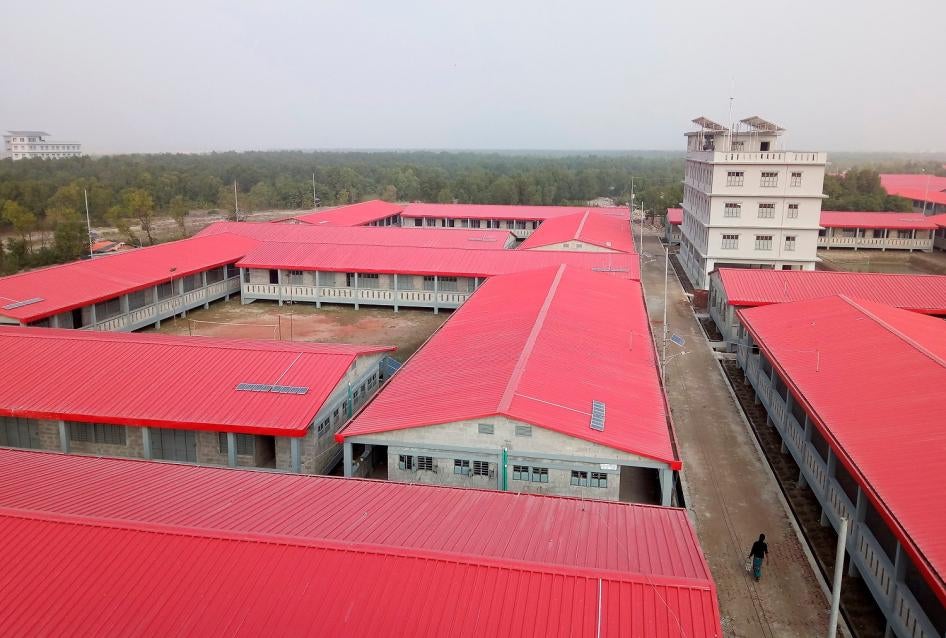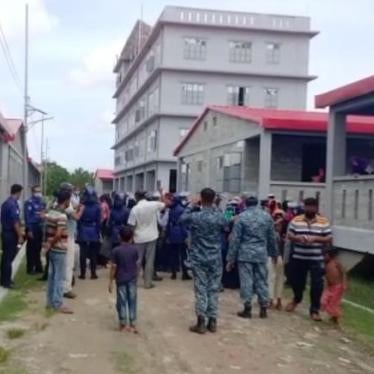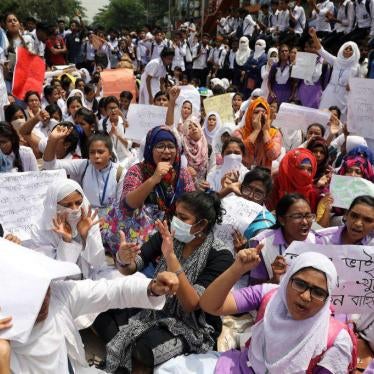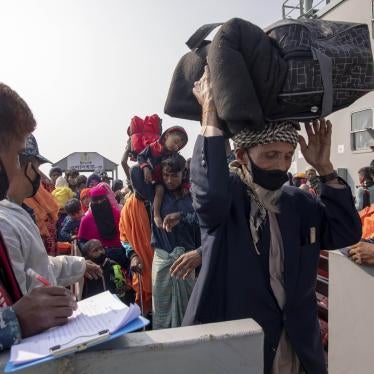(New York) – Bangladesh authorities beat refugees protesting their detention on Bhasan Char Island with sticks and tree branches, Human Rights Watch said today. Naval officers allegedly beat the refugees, including children, in retribution for their hunger strike beginning on September 21, 2020 to demand reunification with their families in the Cox’s Bazar refugee camps.
The beatings occurred while the Bangladesh government reportedly formed a committee to begin relocation of 10,000 Rohingya refugees to Bhasan Char, despite widespread concerns over the island’s habitability.
“In a darkly ironic attempt to portray Bhasan Char as a safe location, Bangladesh authorities beat Rohingya refugees, including children, who were protesting their detention and begging to return to their families in Cox’s Bazar,” said Brad Adams, Asia director. “The real way to show Bhasan Char is secure and habitable would be to allow United Nations experts to conduct an independent assessment of the island and to ensure that any relocation there is voluntary.”
Human Rights Watch interviewed eight refugees who went on the hunger strike.
“Navy personnel used tree branches and black rubber sticks to beat us,” one refugee said. “They beat the protesting women and men, and even the children who were standing with their mothers.” Human Rights Watch examined photos that showed injuries sustained by refugees because of beatings, but was unable to find out whether they received medical care for their injuries.
In video accounts received and analyzed by Human Rights Watch, one Rohingya woman on hunger strike said: “We don’t want food, what we want is to go back to our families.… It’s better to die than to live here.”
The refugees went on hunger strike just days after the government organized a “go and see” visit in which 40 refugees from the camps in Cox’s Bazar, including community leaders and some family members of those being held on the island, were taken to Bhasan Char for 3 days. During the visit, refugees detained on the island pleaded to be allowed to return home with their relatives. Delegation members reported concerns over conditions on the island, including inadequate medical facilities, restrictions on freedom of movement, lack of opportunities for livelihoods, and fears about safety during monsoon season.
One refugee who joined the hunger strike said that the navy personnel told them that even if the refugees were returned to the camps in Cox’s Bazar, those who organized the hunger strike would be kept behind. After the authorities beat them, the refugees ended their hunger strike, but said they had not given up hope of returning to their families in the camps.
Human Rights Watch has previously documented alleged torture and abuse by authorities on Bhasan Char. However, the Bangladesh government has for months refused to allow a promised UN protection visit to the island to provide urgent services to the over 300 refugees who have been detained there since they were brought ashore after months stranded at sea.
The government has also reneged on repeated promises to await clearance from UN agencies and independent technical experts on emergency preparedness, habitability, and safety of the island before relocating Rohingya there. Any decision to relocate Rohingya to Bhasan Char, after the completion of technical assessments, needs to be voluntary and fully informed, Human Rights Watch said.
A government committee formed in late September to manage the relocation of refugees to Bhasan Char appears to be the latest effort to push through a relocation process in contravention of basic rights protections and despite repeated concerns raised by the UN and humanitarian experts.
The arbitrary detention of hundreds of refugees on a possibly uninhabitable remote island without access to humanitarian assistance or basic services violates Bangladesh’s international human rights obligations to provide security, freedom of movement, access to medical care and education, and the right to a livelihood.
“Prime Minister Sheikh Hasina was rightly celebrated for welcoming refugees from Myanmar, but her government is now holding desperate men, women, and children on Bhasan Char,” Adams said. “If UN experts find the island to be safe and habitable, and refugees’ rights are respected, then people may freely choose to relocate there. But beating people up for seeking to reunite with their families is completely unacceptable.”
|
News Release
Bangladesh: Protesting Rohingya Refugees Beaten
Authorities Prepare to Relocate Thousands to Dangerous Island
Your tax deductible gift can help stop human rights violations and save lives around the world.
Region / Country
Tags
Most Viewed
-
June 3, 2025
“They’re Ruining People’s Lives”

-
January 25, 2024
“We’re Dying Here”

-
April 27, 2021
A Threshold Crossed

-
November 25, 2019
A Dirty Investment

-
November 19, 2012
Losing Humanity





